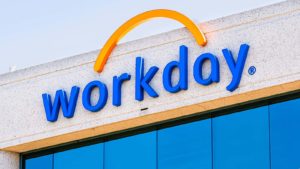First, a handful of software makers, including customer relationship management giant Salesforce (NYSE:CRM) and identity management player Okta (NASDAQ:OKTA), reported financial results that disappointed the Street. And second, most large investors continue to pile their money into the six largest tech firms, plus a few other hardware makers seen as the biggest beneficiaries of the AI boom.
The Street, though, sometimes becomes overly pessimistic or overly optimistic about groups of stocks. For example, the selloffs of regional banks in the first half of 2023 was way overdone, and many names within that group have since bounced back tremendously. Similarly, the decline of many software stocks now is overdone with many rebounding over the longer term. For long-term investors, here are three software stocks to buy on weakness.
ServiceNow (NOW)

ServiceNow (NYSE:NOW) fell about 10% between May 21 and May 30. However, encouragingly, the shares rebounded 9% afterward. The latter increase indicates large investors view ServiceNow as one of the better software stocks to buy on weakness.
Meanwhile, the company’s impressive partnerships leave it very well-positioned to benefit significantly from the AI boom. For example, the firm announced last month it was partnering with IBM (NYSE:IBM) and Microsoft (NASDAQ:MSFT) on AI. Specifically, ServiceNow will utilize IBM’s main AI offering, Watsonx, within its AI platform. ServiceNow will also incorporate two of IBM’s large language models into its Now Assist generative AI software.
Similarly, ServiceNow will offer Microsoft’s CoPilot through Now Assist. These partnerships should make the company’s AI offerings more appealing to many other businesses.
Also encouragingly, last quarter large institutions either held or bought about 170 million shares of NOW stock while only selling 9.35 million shares. And Goldman Sachs recently identified ServiceNow as one of the AI-exposed names that the largest mutual funds were overweighting the most.
Workday (WDAY)

Workday (NASDAQ:WDAY) provides software used by companies to manage their human resources and financial applications. WDAY stock tumbled from $263.66 on May 23 to $215.56 on Jun. 7.
The main catalyst for the huge decline was a truly tiny reduction in the firm’s 2024 subscription revenue guidance. Whereas Workday previously predicted its subscription sales would come in at $7.73 billion to $7.78 billion, it now predicts it will generate 2024 subscription sales of $7.7 billion to $7.725 billion. The very small decrease does not justify the huge reduction in WDAY stock, especially because the company still expects its subscription revenue to climb about 17% this year. Moreover, Workday raised the guidance for its adjusted operating margin to 25%, versus 24.5% previously.
In the wake of the company’s guidance cut, Japanese bank Mizuho trimmed its price target on the shares to $280, well above the current levels of WDAY stock. What’s more, the bank still believes the software maker is poised to grow over the long term.
BlackBerry (BB)

BlackBerry (NYSE:BB) stock has tumbled from $3.47 on May 14 to $2.68 on Jun. 7. The shares rose because they participated in the meme-stock revival and tumbled when the rebound faltered.
But BlackBerry is well-positioned to benefit from the rapid growth of the robotaxi business, Apollo Go, of its China-based partner, Baidu (NASDAQ:BIDU). Specifically, as I noted in a previous column, “the firm reportedly intends to deploy 1,000 of its new robotaxis in one city –Wuhan — alone.” Also importantly, Apollo Go is likely to become profitable next year. It makes Baidu heavily incentivized to keep expanding the unit rapidly over the longer term.
Moreover, in April, Tesla (NASDAQ:TSLA) agreed to use Baidu’s mapping data for its own self-driving offering in China. As a result, I would not be surprised if Tesla begins using BlackBerry’s technology in China. That provides the company with another sizeable boost.
Meanwhile, BlackBerry announced last month that it had nominated Lori O’Neill to join its board, effective Jun. 25. O’Neill was a board member of Sierra Wireless and Phil Brace was the latter company’s CEO when it was acquired in 2022. Now both are about to be serving on BlackBerry’s board together.
That situation provides more evidence to support my previously articulated thesis that all or part of BlackBerry will be acquired sooner or later.
On the date of publication, Larry Ramer held a long position in BB and his wife held a long position in NOW. The opinions expressed in this article are those of the writer, subject to the InvestorPlace.com Publishing Guidelines.
Larry Ramer has conducted research and written articles on U.S. stocks for 15 years. He has been employed by The Fly and Israel’s largest business newspaper, Globes. Larry began writing columns for InvestorPlace in 2015. Among his highly successful, contrarian picks have been SMCI, INTC, and MGM. You can reach him on Stocktwits at @larryramer.
